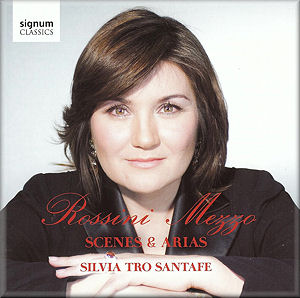 |
 |
|


alternatively
CD:
AmazonUK
AmazonUS
Download: Classicsonline
|
Gioachino ROSSINI (1792
- 1868)
Rossini Mezzo
L’Italiana in Algeri
1. Cruda sorte! Amor tiranno! [4:26]
2. Pronti abbiamo e ferri e mani … Amici, in ogni evento [2:45]
3. Pensa alla patria, e intrepido il tuo dover adempi [6:07]
Tancredi
4. Oh patria! dolce, e ingrata patria! [5:42]
5. Di tanti palpiti, di tanti pene [2:58]
La Cenerentola
6. Della fortuna istabile [3:16]
7. Nacqui all’ affanno e al pianto [6:58]
La Donna del Lago
8. Mura felici, ove il mio ben si aggira! [2:41]
9. Elena! oh tu! [6:47]
10. Ah si pera: ormai la morte [4:43]
11. Douglas, Douglas [3:15]
Semiramide
12. Eccomi affine in Babilonia … [5:24]
13. Ah, quell giorno ognor rammento [6:02]
 Silvia Tro Santafé (mezzo) Silvia Tro Santafé (mezzo)
Lluis Vich Vocalis; Orquesta Sinfónica de Navarra/Julian Reynolds
rec. Auditorio de Baranain, Pamplona, Spain, 26-28 January 2009
Sung texts enclosed
 SIGNUM CLASSICS SIGCD170 [61:06] SIGNUM CLASSICS SIGCD170 [61:06]  |
|
|
‘…
this recital has definitely whetted the appetite for more’ It
was with these words that I finished my review of Silvia Tro
Santafé’s previous recital (see review). That
was just half a year ago (April 2009) and here is the sequel.
The
forerunner
was entitled ‘Spanish Heroines’ which opened with
Rosina’s two arias from Il barbiere di Sevilla.
This explains why Rosina is absent from this all-Rossini disc.
The recital starts with substantial excerpts from Rossini’s
first two real successes, Tancredi and L’Italiana
in Algeri, which having been premiered within a few months
in 1813 catapulted the young composer to the forefront among
Italian opera writers. He turned 21 between the two premieres.
For some reason they are presented here in reverse order, so
the first character we encounter is the amiable but clever
Isabella, a role that Teresa Berganza recorded complete back
in 1963. Stylistically Silvia Tro Santafé reminds me
a lot of Berganza: lyrical, elegant, light and fluent - and
there is a generous helping of warmth as well in both voices
- more so than in that of Marilyn Horne, who otherwise is an
Isabella to reckon with. With springy accompaniments and theatrical
contributions from the chorus these readings are worthy to
set alongside any of the many excellent mezzos who have recorded
this music.
The trouser role of Tancredi is a quite different character
to Isabella, but listening to Di tanti palpiti without
referring to the text, the two seem fairly alike. This is,
to be honest, Rossini’s fault as much as Ms Tro Santafé’s,
and she sings impressively. Even more impressive is her Angelina
in the great final aria from La Cenerentola. This is
one of the most demanding arias in Rossini’s production,
but it is sung with all the requisite virtuosity and security.
Malcolm in La Donna del Lago is another trouser role.
The opera, premiered in Naples in 1819, was the first to be
based on a story by Sir Walter Scott. During the next twenty
years there were twenty-five Italian operas based on his works,
and a number in other languages as well. Here Santafé deploys
her brilliant top to good effect.
Finally there is a third trouser role, Arsace in Semiramide,
and his cavatina only confirms the good impressions from the
earlier numbers. I would say that in the latest generation
of Rossini mezzos, Silvia Tro Santafé is now at the
top, rubbing shoulders with Joyce DiDonato, and she is a worthy
heir to Teresa Berganza. More discs from her, please Signum!
Göran Forsling
|
|
|












